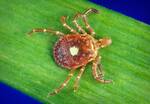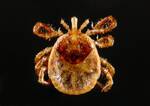
04 Aug Life-Threatening Meat Allergy Transmitted by Lone Star Tick
MedicalResearch.com Interview with:
Ann Carpenter DVM, MPH
Epidemic Intelligence Service Officer
Centers for Disease Control and Prevention
Primary author of the recent CDC MMWR report.

Lone Star Tick Nymph-CDC image
MedicalResearch.com: What is the background for this study? Would you briefly describe Alpha-gal Syndrome?
Response: Alpha-gal syndrome is an emerging and potentially life-threatening allergic condition that is associated with a tick bite. It is also called alpha-gal allergy, red meat allergy, or tick bite meat allergy.
Increasing case studies and anecdotal reports suggested that AGS was a growing concern, but, prior to these studies, information on clinician awareness and the number of people impacted was not available at a national level.
MedicalResearch.com: How is it transmitted and recognized?

Lone Star Tick Nymph, Alpha Gal Allergy, Meat allergy
CDC image
Response: Evidence suggests that AGS is primarily associated with the bite of a lone star tick in the United States, but other kinds of ticks have not been ruled out. AGS is not caused by an infection—it is an allergy to the alpha-gal sugar molecule, which is found in red meat and other products derived from mammals.
People who suffer from Alpha-gal syndrome may experience wide ranging symptoms including hives or itchy rash, nausea or vomiting, heartburn or indigestion, diarrhea, cough, shortness of breath, or difficulty breathing, drop in blood pressure, swelling of the lips, throat, tongue, or eye lids, dizziness or faintness, or severe stomach pain.
AGS is diagnosed by an allergist or other healthcare provider and requires a thorough history with compatible symptoms, and a diagnostic blood test that looks for specific antibodies (proteins made by your immune system) to alpha-gal.
MedicalResearch.com: What are the main findings?
Response: These new CDC reports show that AGS is of increasing concern for public health, but many healthcare providers are unaware of the condition and how to diagnose or manage it. Between 2010 and 2022, there were more than 110,000 suspected cases of alpha-gal syndrome identified in the United States. However, 42% of healthcare providers surveyed had never heard of alpha-gal syndrome.
MedicalResearch.com: What should readers take away from your report?
Response: The best way to protect yourself from developing AGS is to prevent tick bites. Use Environmental Protection Agency (EPA)-registered insect repellents, and shower and check your body, clothing, and gear for ticks after spending time outdoors.
If you believe you have symptoms consistent with AGS, talk to your healthcare provider. AGS is diagnosed by an allergist or other healthcare provider through a detailed patient history, physical examination, and a blood test that looks for specific antibodies (proteins made by your immune system) to alpha-gal.
While no treatment for alpha-gal syndrome is currently available, healthcare providers can help patients manage their condition by helping them identify which alpha-gal containing products need to be avoided and talking to patients about preventing tick bites.
MedicalResearch.com: What recommendations do you have for future research as a results of this study?
Response: There is no national surveillance for AGS, so the estimates of AGS cases in the United States are based only on laboratory findings from 2010 to 2022. Additional data and research are needed to better understand the burden of this condition and where people are most at risk and why. Although the condition is primarily associated with lone star ticks, a potential role for other tick species is a subject for further research.
No disclosures
Citation:
Thompson JM, Carpenter A, Kersh GJ, Wachs T, Commins SP, Salzer JS. Geographic Distribution of Suspected Alpha-gal Syndrome Cases — United States, January 2017–December 2022. MMWR Morb Mortal Wkly Rep 2023;72:815–820. DOI: http://dx.doi.org/10.15585/mmwr.mm7230a2
The information on MedicalResearch.com is provided for educational purposes only, and is in no way intended to diagnose, cure, or treat any medical or other condition. Always seek the advice of your physician or other qualified health and ask your doctor any questions you may have regarding a medical condition. In addition to all other limitations and disclaimers in this agreement, service provider and its third party providers disclaim any liability or loss in connection with the content provided on this website.
